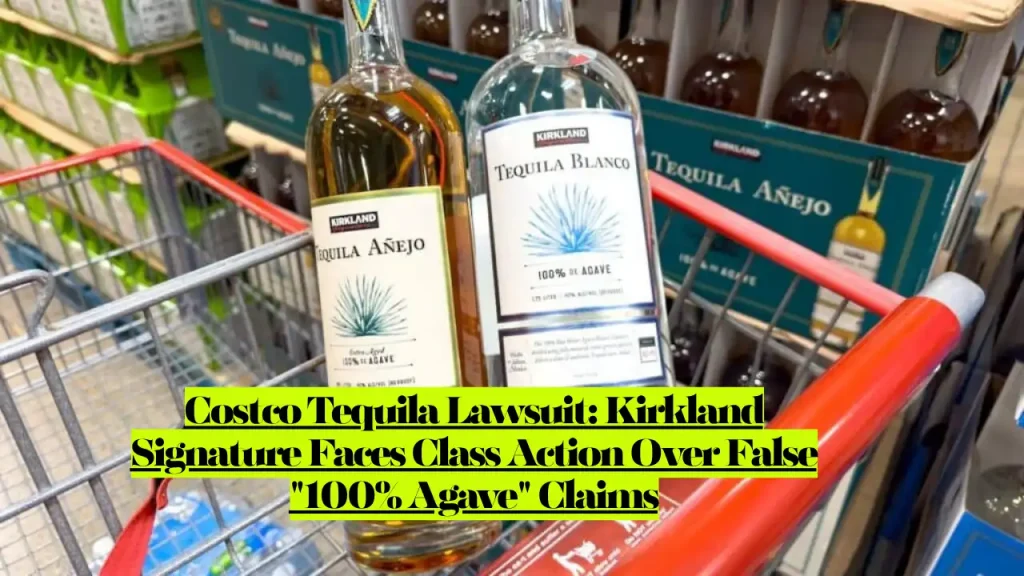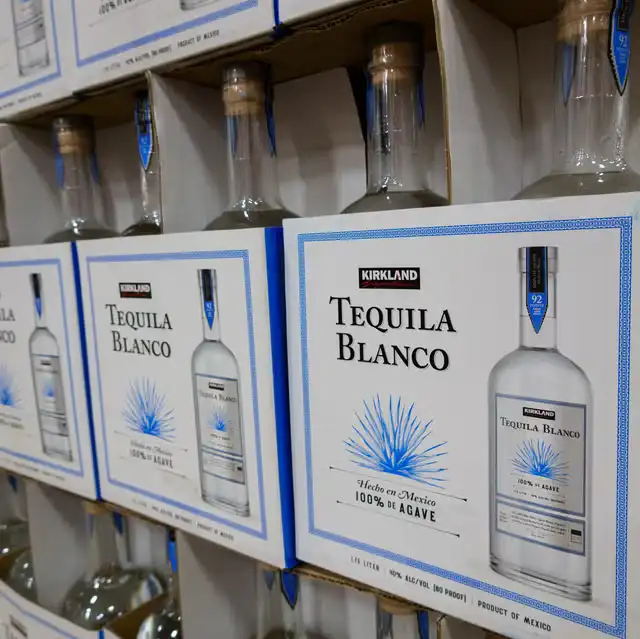Costco Tequila Lawsuit, Kirkland Signature Accused of Selling Fake “100% Agave” Tequila—It May Not Even Be Tequila at All
Costco faces a nationwide class action lawsuit alleging its Kirkland Signature tequila falsely advertises “100% Blue Weber agave” when it actually contains ethanol from non-agave sources like cane sugar or corn alcohol. Filed in U.S. District Court for the Southern District of Florida (Case No. 1:25-cv-25057), plaintiff Ariel Glazer claims customers paid premium prices—$18 to $49 per bottle—for what they believed was pure agave tequila. Nuclear Magnetic Resonance testing allegedly found so much cane sugar in Kirkland Signature Añejo Cristalino that it wouldn’t qualify as tequila under Mexican law.
What Is the Costco Tequila Lawsuit About?
The lawsuit alleges Costco’s Kirkland Signature tequila contains ethanol from non-agave sources, violating Florida’s deceptive and unfair trade practices law. Five varieties are named: Blanco, Reposado, Añejo, Añejo Cristalino, and Extra Añejo, all prominently labeled “100% DE AGAVE” and “100% AGAVE AZUL.”
Under U.S. and Mexican tequila regulations, brands may only claim “100% agave” if made exclusively from blue agave sugars. Testing showed Kirkland Signature Añejo Cristalino contained alcohol more consistent with sugarcane or corn, falling outside acceptable ranges for both 100% agave tequila and even “mixto” tequilas, which can legally contain up to 49% non-agave sugars.

Specific Allegations Against Kirkland Signature Tequila
The complaint makes several key allegations:
- False labeling: Costco falsely branded products as “100% de Agave” or “100% Blue Agave” when they contain cheaper, non-agave alcohol.
- Premium pricing deception: Customers paid premium prices believing they purchased pure, high-quality products, and would not have bought them—or would have paid less—had they known the truth.
- Widespread adulteration: The suit claims all Kirkland Signature tequilas are made from the same base spirit, so testing results apply to the entire brand line.
- Not legally tequila: The cane sugar content was allegedly so high that the product can’t be qualified as a mixto, meaning by Mexican law it is not actually tequila at all.
Who Is Affected by the Lawsuit?
The lawsuit seeks to represent a nationwide class of consumers who purchased Kirkland Signature tequila during the applicable statute of limitations period. Products typically range from $18 to $31 and are currently unavailable on Costco’s website.
Anyone who purchased Kirkland Signature Blanco, Reposado, Añejo, Añejo Cristalino, or Extra Añejo tequila believing it was 100% agave may be part of the affected class.
Current Legal Status and Recent Developments
The lawsuit was recently announced with the plaintiff demanding a jury trial and seeking compensatory damages, though there’s no sign of a settlement yet. A separate 54-page complaint was filed in U.S. District Court for the Western District of Washington, naming both Costco Wholesale Corp. and its supplier, Santa Lucia Corporate Distillery of Mexico, as defendants.
This separate lawsuit claims both companies knowingly participated in a fraudulent scheme to profit from falsely certified tequila, violating federal racketeering laws (RICO) and multiple state consumer protection acts. Plaintiffs allege Costco “possessed exclusive knowledge” that the tequila was adulterated, concealed it from consumers, and extracted “hundreds of millions if not billions of dollars” from deceived customers.
The Science Behind the Claims
Nuclear Magnetic Resonance can analyze different isotopes in ethanol produced by different plants to determine where the ethanol came from. The Mexican government has approved NMR testing as a legitimate method for determining if tequila is 100% agave.
However, this method has been criticized for not being the best or most complete way to determine adulterations because telling agave apart from cane sugar is difficult, and other analyses are recommended.
Legal Violations Alleged
The suit accuses Costco of negligence, negligent misrepresentation, unjust enrichment, and violating Florida’s Deceptive and Unfair Trade Practices Act. Washington state claims allege Costco engaged in “unfair or deceptive acts” that were “immoral, unethical, oppressive, or unscrupulous” and caused “substantial injury to consumers.”
Why This Matters for Consumers
Mixto tequilas must consist of at least 51% agave, while the remaining 49% can include cane sugar, high fructose corn syrup, or other sugars, plus artificial colors, flavors, and thickeners. Some believe mixto tequilas can lead to notorious “tequila hangovers,” as mixing pure agave with sugars and artificial flavors has similar effects to mixing different kinds of alcohol.
The concern isn’t just about hangovers—it’s about knowing exactly what you’re paying for. If allegations prove true, Kirkland tequilas would not qualify as premium-level products, and the brand would need to change its formulas or labels.
Costco’s Tequila Production
Kirkland Tequila is made by Corporate Distillery Santa Lucia, S.A. de C.V., a company based in Jalisco, the heart of tequila country. Kirkland Signature is a contract brand (NOM 1173) currently produced at Newton (Destileria Santa Lucia).
Because the tequila is made in distilleries in Mexico, it’s possible cane sugar is being added without Costco’s knowledge. It seems challenging to prove Costco was actually in on the game, as many contract brands have put blind trust in tequila’s reputation for being one of the most closely regulated liquors.

What Plaintiffs Are Seeking
The plaintiffs seek a jury trial, declaratory and injunctive relief, and compensatory damages for all class members. They ask for compensatory and punitive damages, restitution, and court orders requiring Costco to stop selling mislabeled products and correct its marketing.
Plaintiffs argue individual lawsuits would be too costly given the tequila’s price and claim complexity, making class action the most efficient way to hold Costco accountable.
Timeline Context
The lawsuit references public protests by agave farmers in Tequila, Jalisco, where members of the Mexican Agave Council and agaveros from several states convened to make demands on the tequila industry. Only after that protest and subsequent coverage by industry publications could plaintiffs have reasonably learned of the alleged adulteration, with the applicable statute of limitations tolled until at least January 13, 2025.
What Should Affected Consumers Do?
If you purchased Kirkland Signature tequila:
- Monitor the case: Track developments in Case No. 1:25-cv-25057 in the U.S. District Court for the Southern District of Florida.
- Keep receipts: Preserve purchase documentation if you bought affected products.
- Watch for class notification: If the court certifies the class, eligible consumers will receive notification about participation options.
- Consider legal counsel: Consult an attorney if you have specific questions about your rights or potential claims.
More than 10 plaintiffs are seeking monetary damages. The full details will likely only emerge if the case proceeds to trial.
Frequently Asked Questions
What is the Costco tequila lawsuit about?
A class action lawsuit alleges Costco falsely advertises its Kirkland Signature tequila as made from 100% blue agave when it allegedly contains ethanol from other sources like cane sugar or corn alcohol.
Which Kirkland tequila products are affected?
Five varieties are named: Blanco, Reposado, Añejo, Añejo Cristalino, and Extra Añejo, all labeled “100% DE AGAVE.”
What evidence supports the lawsuit?
Nuclear Magnetic Resonance testing of Kirkland Signature Añejo Cristalino showed it contained alcohol more consistent with sugarcane or corn, falling outside acceptable ranges for both 100% agave tequila and mixto tequilas.
Where was the lawsuit filed?
The case was filed as Ariel Glazer v. Costco Wholesale Corp., Case No. 1:25-cv-25057, in the U.S. District Court for the Southern District of Florida.
What damages are being sought?
Plaintiffs seek a jury trial, declaratory and injunctive relief, and compensatory damages for all class members.
Could Costco have been unaware of the issue?
Because Costco uses distillers in Mexico, if the tequila has been adulterated, it could have been done without Costco’s knowledge. However, one complaint alleges Costco “possessed exclusive knowledge” that the tequila was adulterated and concealed that information from consumers.
What’s the difference between 100% agave and mixto tequila?
100% agave tequila must be made fully from blue agave. Mixtos must consist of at least 51% agave, while the remaining 49% can include cane sugar, high fructose corn syrup, or other sugars, plus artificial colors, flavors, and thickeners.
Disclaimer: This information is for educational purposes only and does not constitute legal advice. Costco tequila lawsuit details, allegations, legal status, and developments may change based on court orders and ongoing proceedings. Consult official court documentation, review case details independently, contact the court for official information, and contact a legal professional for specific questions about the lawsuit or your involvement.
About the Author

Sarah Klein, JD, is a licensed attorney and legal content strategist with over 12 years of experience across civil, criminal, family, and regulatory law. At All About Lawyer, she covers a wide range of legal topics — from high-profile lawsuits and courtroom stories to state traffic laws and everyday legal questions — all with a focus on accuracy, clarity, and public understanding.
Her writing blends real legal insight with plain-English explanations, helping readers stay informed and legally aware.
Read more about Sarah
